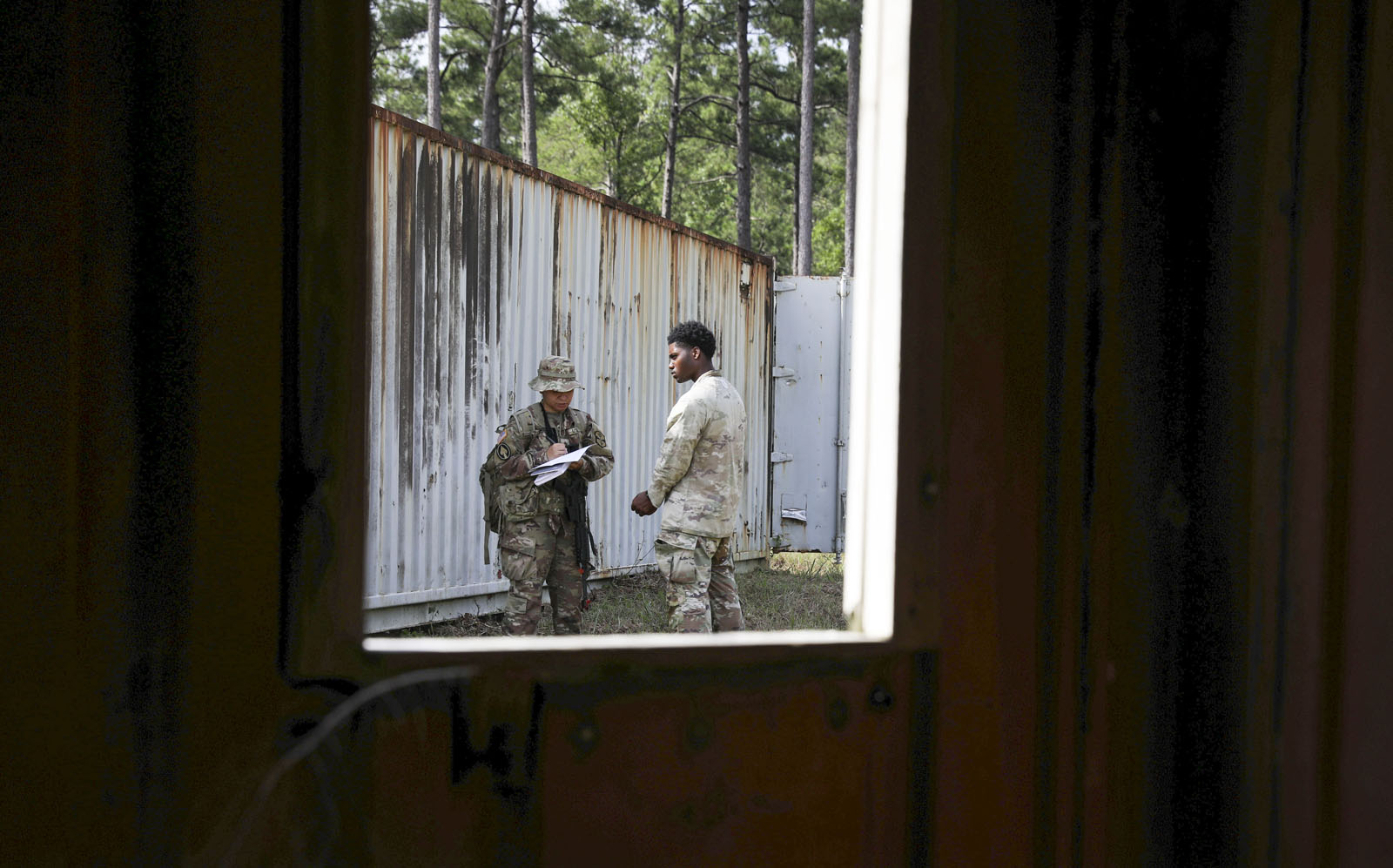Excellence showcased in third annual Army interrogation team competition
La. Guard hosts annual Army interrogation team competition
By Staff Sgt. Noshoba Davis, Louisiana National Guard Public Affairs Office
PINEVILLE, La. – While athletes from around the world compete in the Summer Olympics in Paris, France, 15 human intelligence (HUMINT) collector teams gathered in Louisiana to compete in the 3rd annual Army interrogator team competition, “Tranquil Storm,” held at Louisiana National Guard Training Center Pineville, July 29 – August 02.
Originally dubbed the “Interrogation Olympics” in its first year, the competition is a multi-component, multi-echelon event designed to challenge intelligence Soldiers in leadership, tactical skills and technical tasks within a simulated large-scale combat operating environment. It aims to foster cohesion and esprit de corps while determining the Army’s best interrogation team.
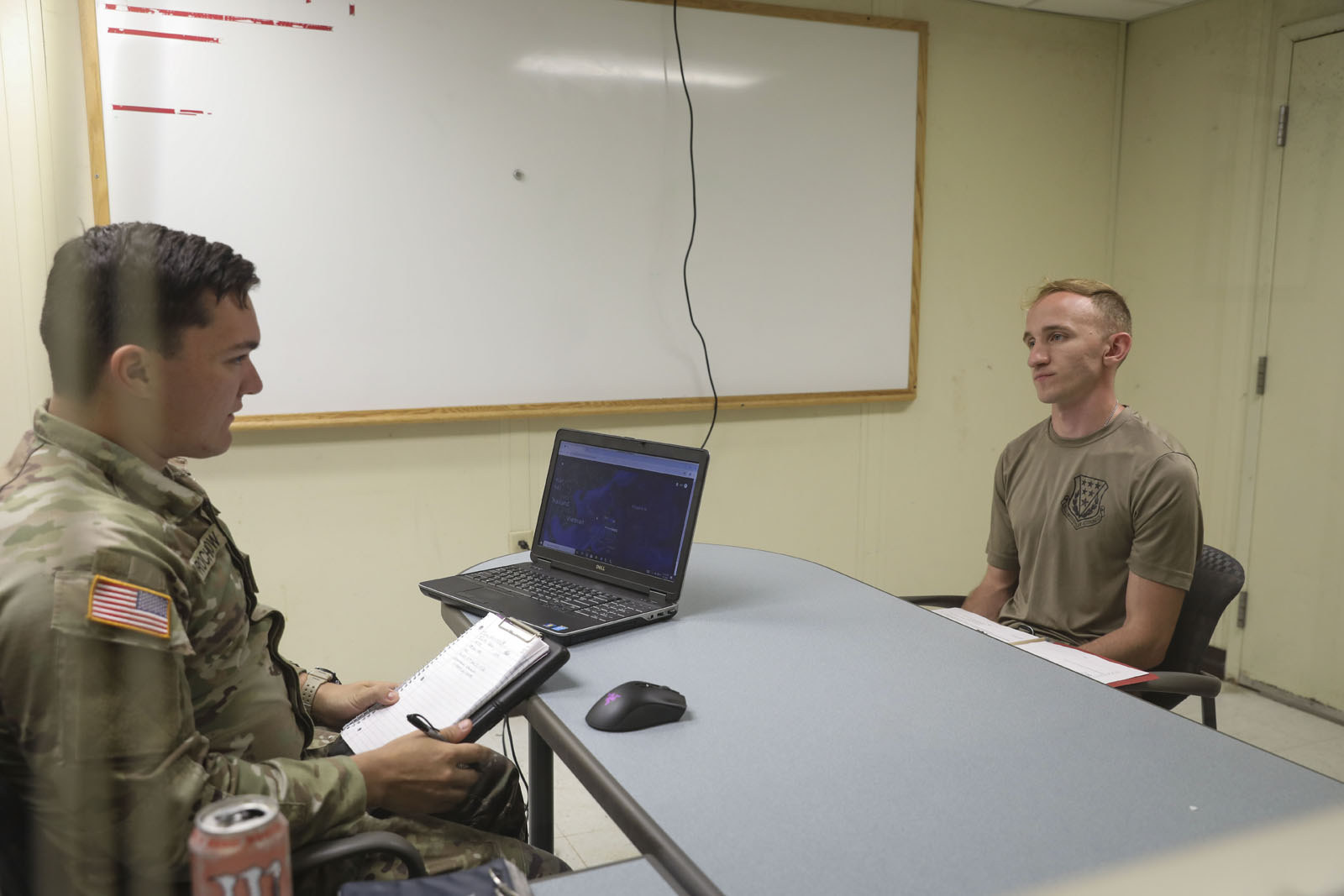 “The Army interrogation team competition is an event made to test human intelligence Soldiers on their skills as they measure against other HUMINT Soldiers across the force,” said Chief Warrant Officer 3 Juan Trevino, Army National Guard G2X HUMINT Functional Team Lead. “The competition idea came from watching HUMINT Soldiers at exercises and events where they provided training similar to the crawl, walk, run concept and then were evaluated. We needed a way to assess Soldiers’ unit training effectiveness in a competitive environment in the ‘run’ phase as they are expected to perform in a large-scale combat operation environment. The competition has maintained its focus on LSCO with screenings, debriefings and interrogations throughout the last three competitions. This is where the majority of HUMINT will be engaged.”
“The Army interrogation team competition is an event made to test human intelligence Soldiers on their skills as they measure against other HUMINT Soldiers across the force,” said Chief Warrant Officer 3 Juan Trevino, Army National Guard G2X HUMINT Functional Team Lead. “The competition idea came from watching HUMINT Soldiers at exercises and events where they provided training similar to the crawl, walk, run concept and then were evaluated. We needed a way to assess Soldiers’ unit training effectiveness in a competitive environment in the ‘run’ phase as they are expected to perform in a large-scale combat operation environment. The competition has maintained its focus on LSCO with screenings, debriefings and interrogations throughout the last three competitions. This is where the majority of HUMINT will be engaged.”
The 15 HUMINT collector teams consisted of four collectors, representing all Army components from across the United States Army Forces Command, Intelligence and Security Command, U.S. Army National Guard and U.S. Army Reserve.
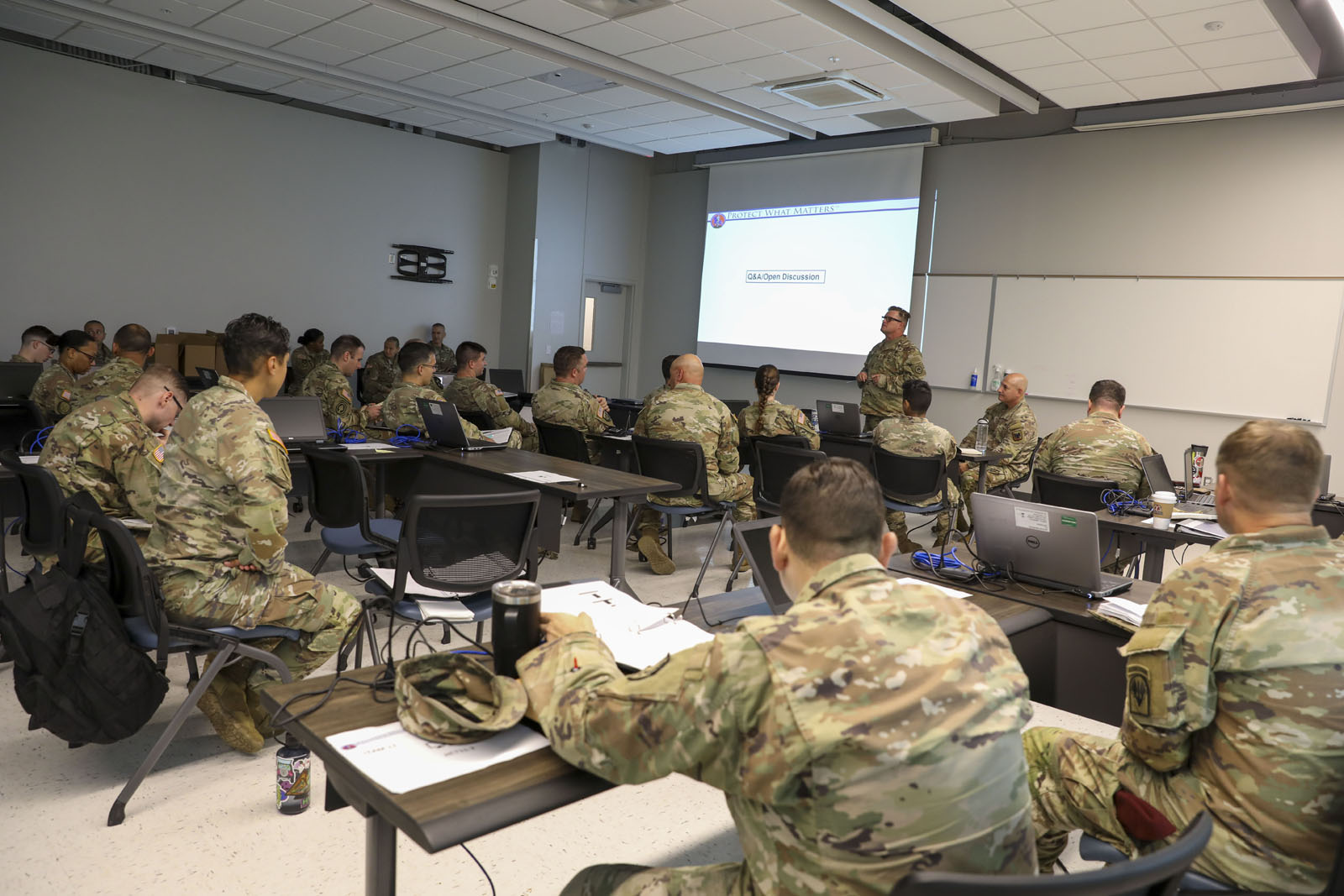 Prior to competitors’ arrival for the competition, INSCOM’s Intelligence Training Center (I2TC) held a role player and evaluator academy.
Prior to competitors’ arrival for the competition, INSCOM’s Intelligence Training Center (I2TC) held a role player and evaluator academy.
“In order for us to do our job or train, we have to have personnel to role-play individuals to conduct overt HUMINT activities, debriefings and interrogations,” said Mr. Nicholas Bowe, HUMINT senior advisor and operations for I2TC.
Bowe explained that the role player academy prepares role players to understand not only their roles but also how they should play the role and interact with the interrogators.
“It can seriously affect the conduct and evaluation of that interrogation,” said Bowe. “Especially for a competition, you want the role player proficient and standard across the board. The academy provides time for the role player to learn, memorize and study the environment to make the interrogation more realistic.”
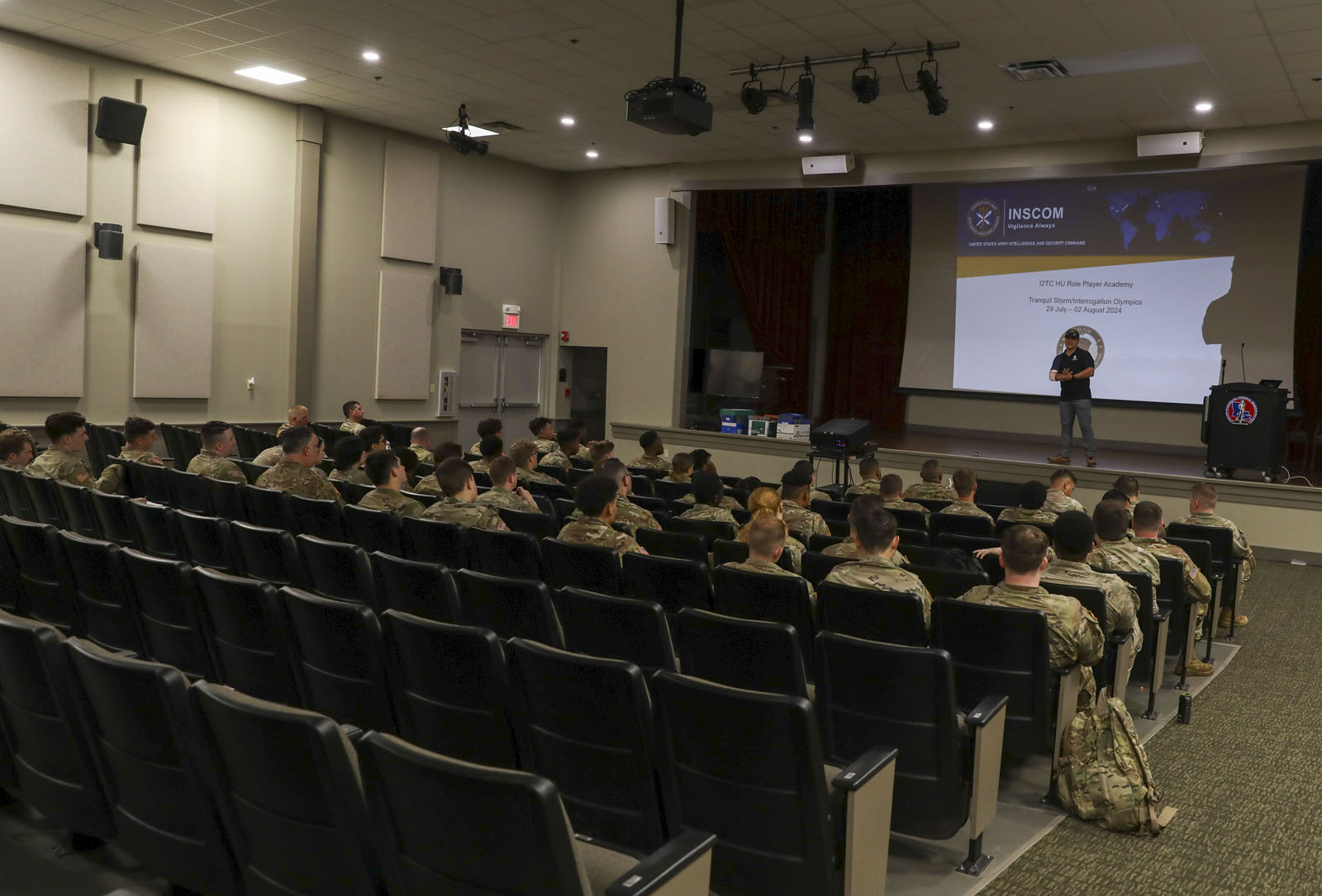 He went on to explain that the same standards apply to evaluators during their pre-competition training. “You have to make sure all evaluators are standard across the board, fully understand the grading criteria and providing unbiased evaluations,” Bowe concluded.
He went on to explain that the same standards apply to evaluators during their pre-competition training. “You have to make sure all evaluators are standard across the board, fully understand the grading criteria and providing unbiased evaluations,” Bowe concluded.
On July 29, teams were welcomed to Louisiana and the competition before receiving multiple briefs, to include situation overview / in-brief and rules of engagement. Over the course of three days, July 30 to August 01, Tranquil Storm tested the teams’ HUMINT collection skills on four separate lanes: Point of Capture, Detainee Collection Point, Division Holding Area and Joint Interrogation Debriefing Center.
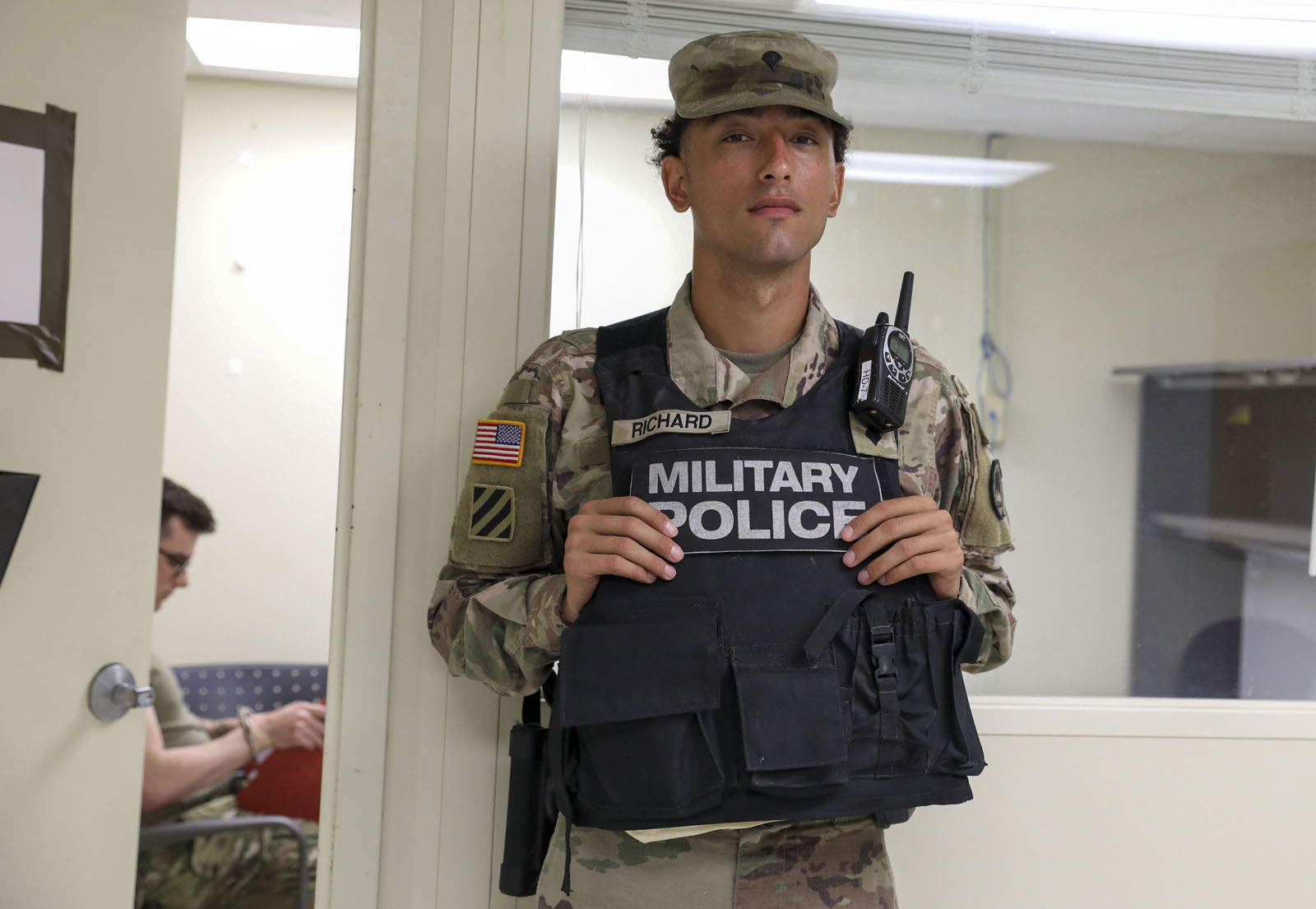 Day one of competition began with teams being alerted and tasked to meet with a maneuver element to conduct mass screening of detained personnel. Alerted teams were inserted into the competition scenario by air movement via UH-60 Blackhawk helicopters to the point of capture to replicate real world operations and began screening personnel. While interrogating, teams received detainee information from LANG military police, who acted as area security and managed all detainee movement. After completing mass screening, teams rucked a mile and a half to the detainee collection point to further interrogate detainees in a field environment.
Day one of competition began with teams being alerted and tasked to meet with a maneuver element to conduct mass screening of detained personnel. Alerted teams were inserted into the competition scenario by air movement via UH-60 Blackhawk helicopters to the point of capture to replicate real world operations and began screening personnel. While interrogating, teams received detainee information from LANG military police, who acted as area security and managed all detainee movement. After completing mass screening, teams rucked a mile and a half to the detainee collection point to further interrogate detainees in a field environment.
As team leader, Staff Sgt. Roy James, a HUMINT collector with the LANG’s 415th Military Intelligence Battalion, explained that teamwork was the most important thing his team focused on and that establishing a plan early on allowed his team to execute seamlessly.
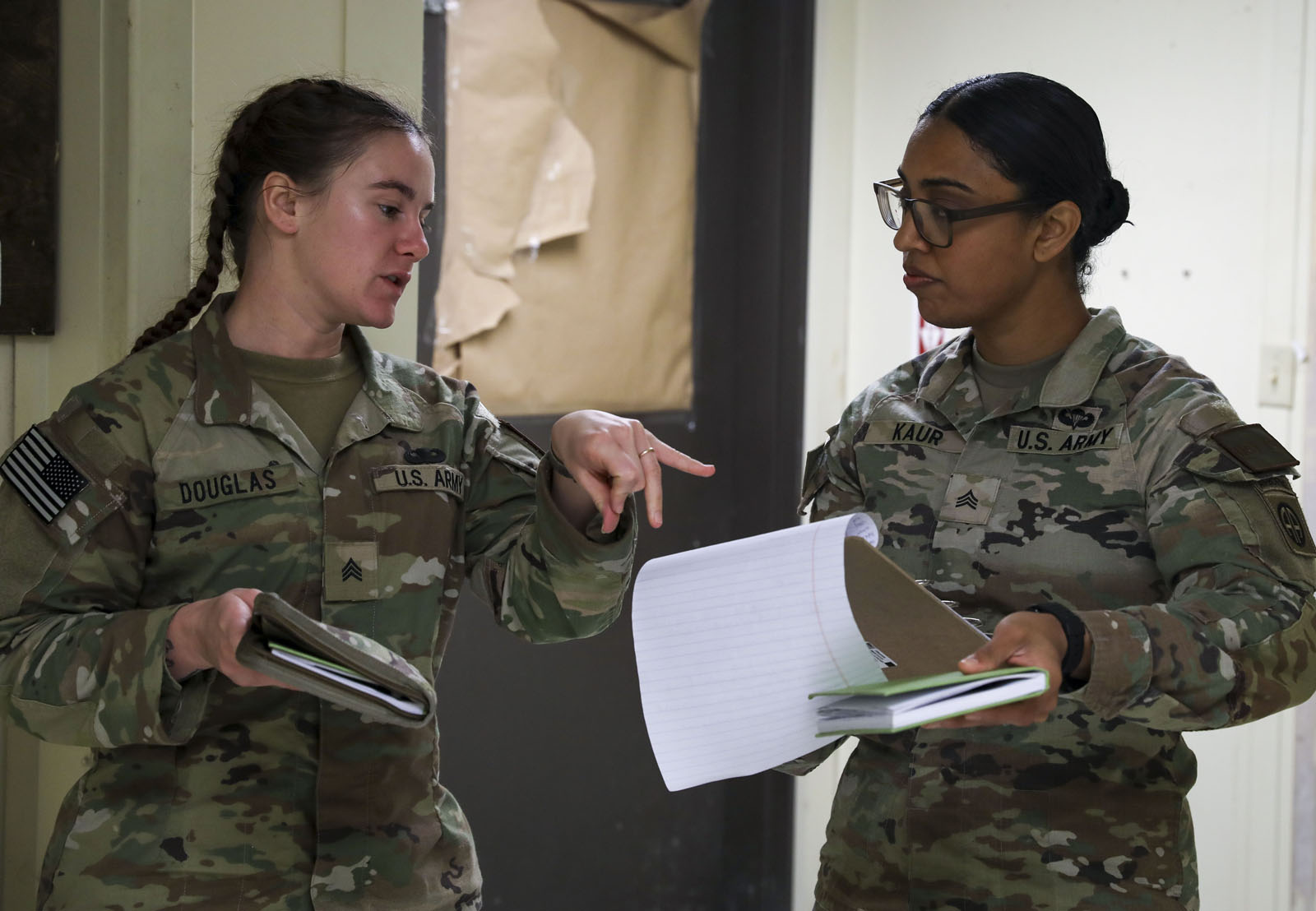 “It is important to work together and be on the same page because we all have the same end goal: to do well in the competition,” said James. “Not being on the same page would have created unnecessary stress and strain on the team.”
“It is important to work together and be on the same page because we all have the same end goal: to do well in the competition,” said James. “Not being on the same page would have created unnecessary stress and strain on the team.”
On day two, teams had to support a division holding area, which housed an unknown number of enemy prisoners of war waiting to be interrogated. Each team had two hours for each interrogation and, upon completion, another two hours to submit their reports.
For role players like LANG’s Sgt. Ian Chauvin, who acted as an enemy officer with pertinent information, the most challenging part was learning his character and becoming that person.
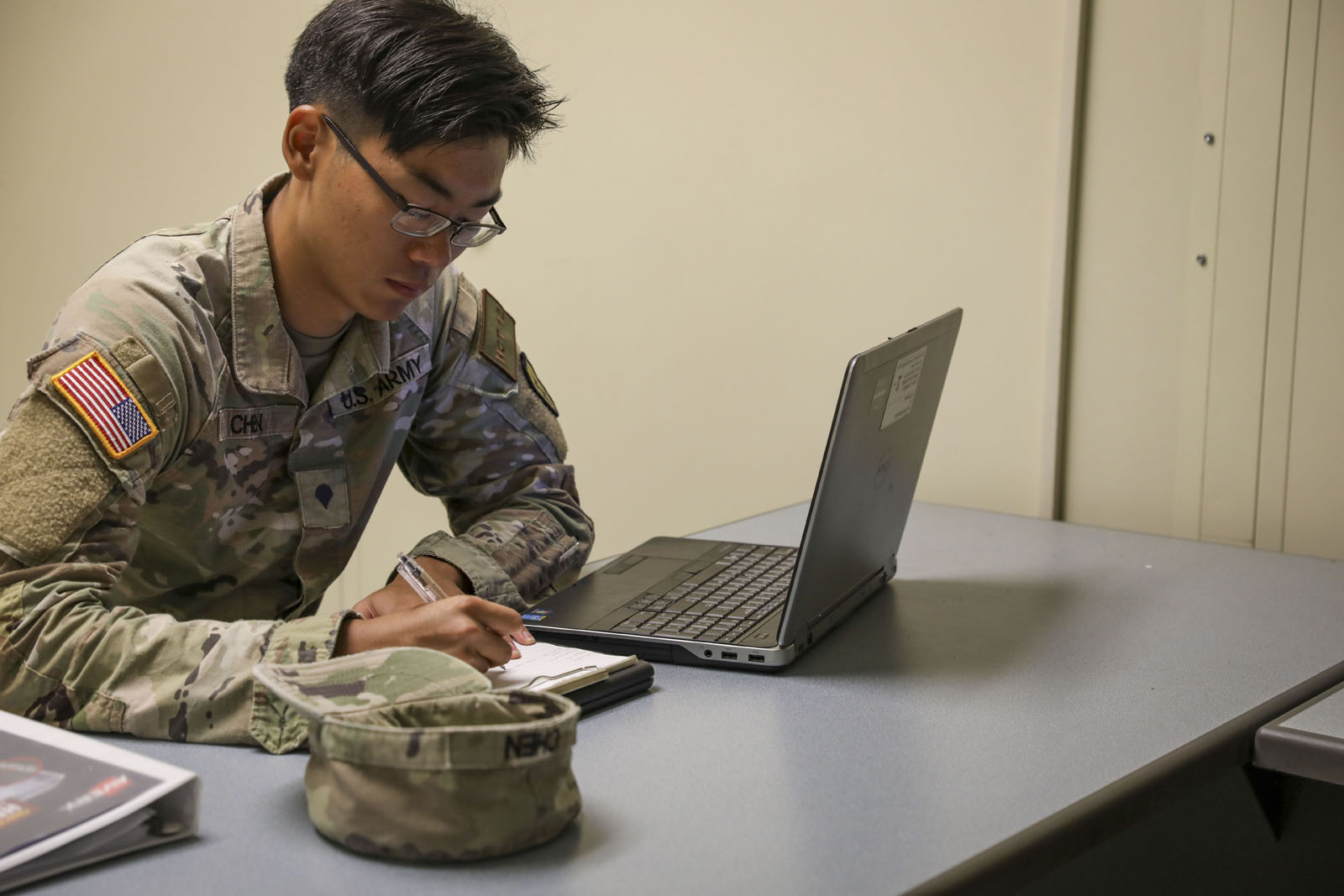 “Most of the packets for each character were pretty large and packed full of knowledge. It was not only learning all the information about your character, but also trying to become that person. You had to act like them and, while being interrogated, change your emotions based on your character,” said Chauvin. “In order to keep the competition fair, each role player has to stick to what is in their packet of knowledge for that character, or it would make it unfair for the other teams if certain information is wrong.”
“Most of the packets for each character were pretty large and packed full of knowledge. It was not only learning all the information about your character, but also trying to become that person. You had to act like them and, while being interrogated, change your emotions based on your character,” said Chauvin. “In order to keep the competition fair, each role player has to stick to what is in their packet of knowledge for that character, or it would make it unfair for the other teams if certain information is wrong.”
On day three, the final day of competition, teams supported joint interrogation and debriefing center operations, which again held an unknown number of EPWs needing to be interrogated. Teams were given four hours to coordinate, plan, prep and interrogate the EPWs, and once complete, submit their reports no later than two hours after the completion of interrogation. While interrogations were taking place, LANG MPs provided detainee escort to and from the interrogation booths and security for the interrogators if they needed to step out of the interrogation for any reason.
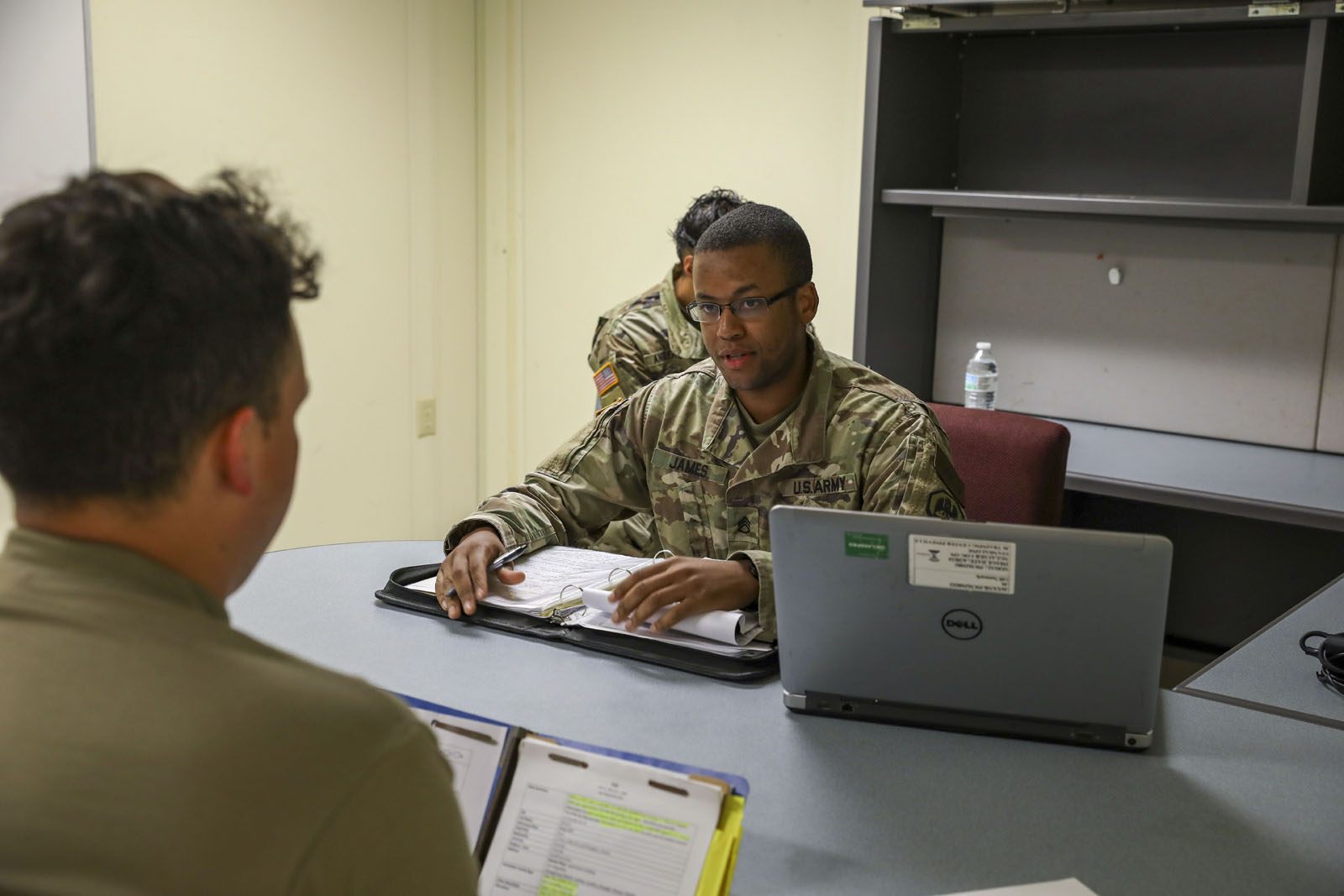 While teams conducted interrogations on the final day, distinguished visitors from FORSCOM, the Australian Army, INSCOM, the Department of the Army, the Army National Guard G2 office, I2TC, the U.S. Army Military Intelligence Readiness Command, the Capability Development Integration Directorate and United States Army Pacific Command, as well as key leadership from the LANG, received an overview brief about the competition while enjoying breakfast prepared by the LANG culinary specialists with the 916th Quartermaster Platoon, 139th Regional Support Group.
While teams conducted interrogations on the final day, distinguished visitors from FORSCOM, the Australian Army, INSCOM, the Department of the Army, the Army National Guard G2 office, I2TC, the U.S. Army Military Intelligence Readiness Command, the Capability Development Integration Directorate and United States Army Pacific Command, as well as key leadership from the LANG, received an overview brief about the competition while enjoying breakfast prepared by the LANG culinary specialists with the 916th Quartermaster Platoon, 139th Regional Support Group.
Visitors from Australia observed the competition to bring back lessons learned to their country and prepare teams for future competitions in the United States.
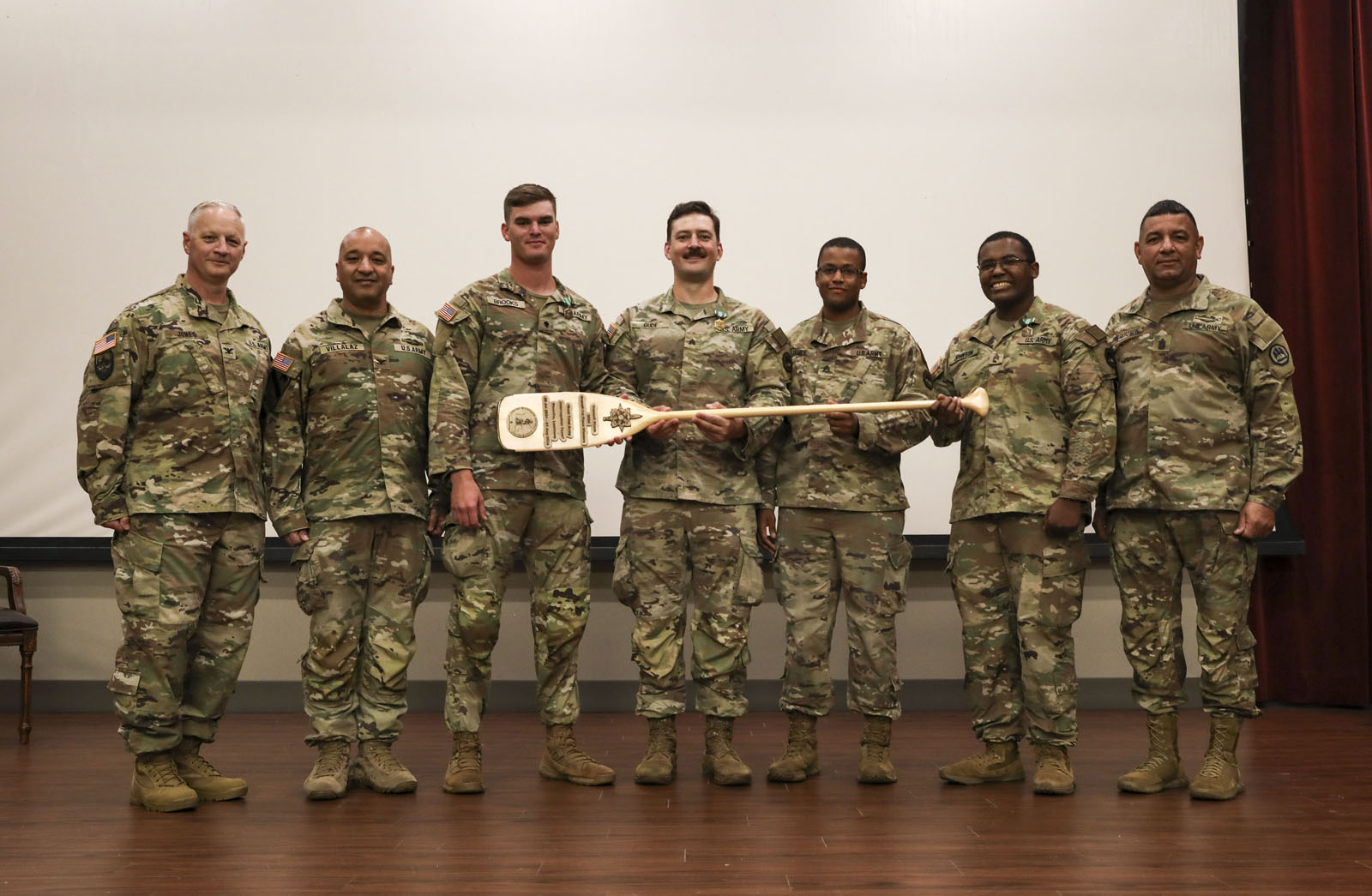 The competition concluded with an awards ceremony where the top three teams were presented with awards. LANG’s Director of the Joint Staff, Col. Augusto Villalaz, presided over the ceremony. Villalaz commended all support roles for their hard work in making the competition come together and congratulated competitors for their dedication throughout the event.
The competition concluded with an awards ceremony where the top three teams were presented with awards. LANG’s Director of the Joint Staff, Col. Augusto Villalaz, presided over the ceremony. Villalaz commended all support roles for their hard work in making the competition come together and congratulated competitors for their dedication throughout the event.
“Congratulations on the culmination of the 3rd annual Army interrogation team competition, known as Tranquil Storm,” said Villalaz. “We had 15 teams competing that gave 110%, but what I am most proud of is that you chose to compete! You chose to challenge yourselves, so you are all winners in my book.”
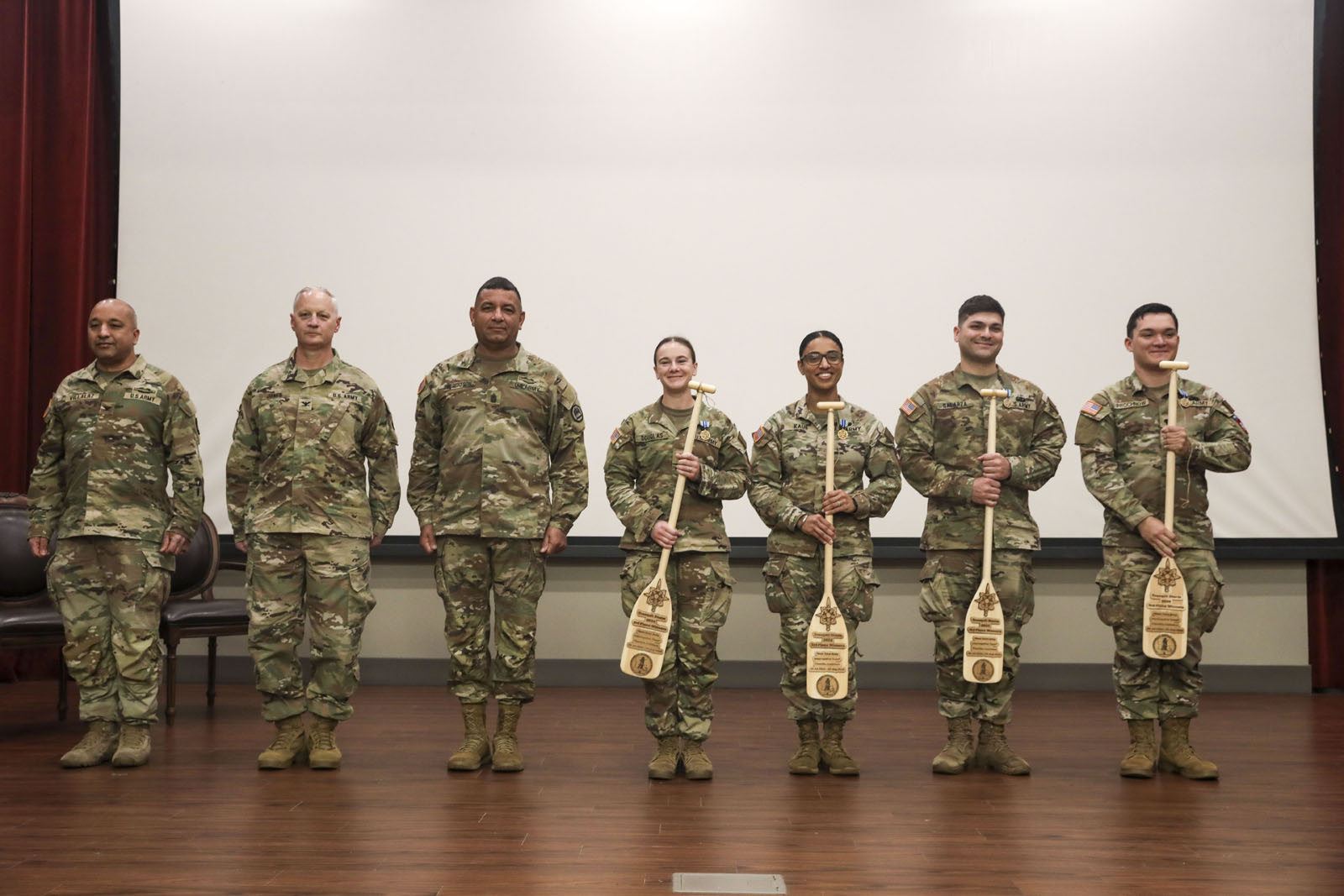 Villalaz concluded, “Tranquil Storm is first a competition, but it also serves as a training event for large-scale combat operations and hones and improves your skills as human intelligence collectors. Intelligence gathering is very important to the Army’s mission. The information you collect, analyze and report could mean the success in battle and the preservation of your fellow Soldiers’ lives.”
Villalaz concluded, “Tranquil Storm is first a competition, but it also serves as a training event for large-scale combat operations and hones and improves your skills as human intelligence collectors. Intelligence gathering is very important to the Army’s mission. The information you collect, analyze and report could mean the success in battle and the preservation of your fellow Soldiers’ lives.”
After placing second the last two years, the LANG’s 415th Military Intelligence Battalion placed first, the 524th Military Intelligence Battalion based in South Korea placed second and 82nd Airborne Division based at Fort Liberty, North Carolina, placed third.
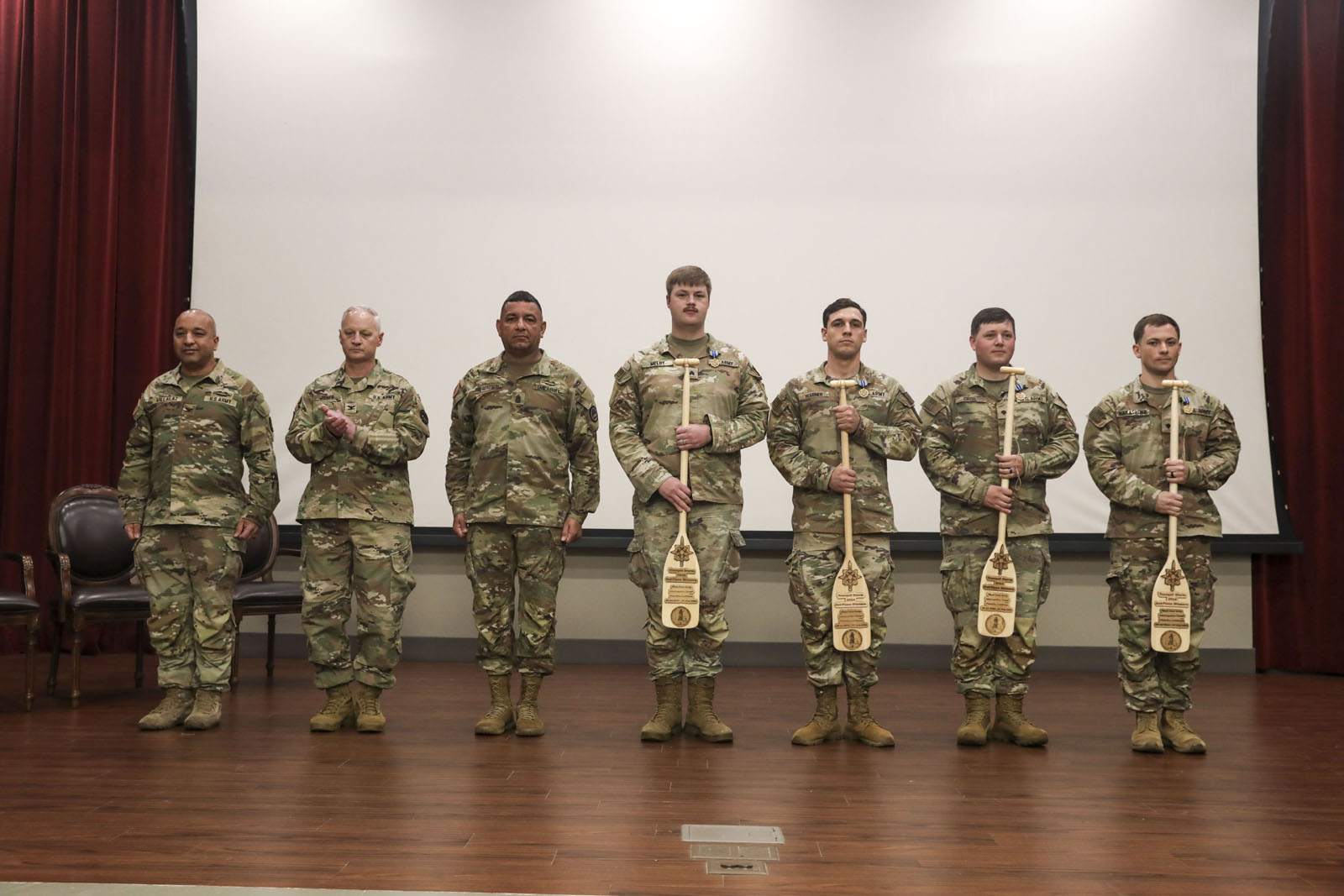 “The biggest challenge was overcoming the nerves and the excitement coming off last year’s performance. Thankfully, no one from our unit put a lot of pressure on us to repeat or surpass our second place showing last year,” said Sgt. Andrew Gude, a HUMINT collector and second-year competitor for LANG. “I definitely put that pressure on myself because I wanted to prove it was no fluke and show that I contributed to the best of my abilities both times.”
“The biggest challenge was overcoming the nerves and the excitement coming off last year’s performance. Thankfully, no one from our unit put a lot of pressure on us to repeat or surpass our second place showing last year,” said Sgt. Andrew Gude, a HUMINT collector and second-year competitor for LANG. “I definitely put that pressure on myself because I wanted to prove it was no fluke and show that I contributed to the best of my abilities both times.”

